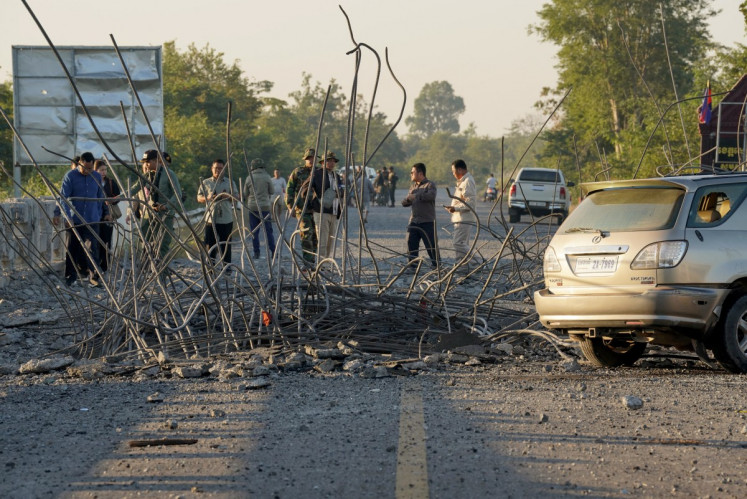Popular Reads
Top Results
Can't find what you're looking for?
View all search resultsPopular Reads
Top Results
Can't find what you're looking for?
View all search resultsASEAN, China to collaborate on coronavirus
Jose Tavares - Indonesia’s top ASEAN official (kemlu
Change text size
Gift Premium Articles
to Anyone
Jose Tavares - Indonesia’s top ASEAN official (kemlu.go.id)
Top diplomats from Southeast Asia are to meet their Chinese counterpart on Thursday in Laos in search of a collective response to the novel coronavirus outbreak, a senior foreign policy official from Indonesia confirmed, as the region starts to reel from the effects of the epidemic.
ASEAN foreign ministers are to convene in an upcoming emergency ministerial meeting in Vientiane to explore possible cooperation with China to mitigate the impact of the virus, which has infected upward of 50,000 people and killed nearly 2,000 — predominantly in China’s Hubei province and mostly in the central city of Wuhan, the epicenter of the outbreak.
“[The meeting] will discuss further cooperation on the coronavirus [response] and also [to prepare for when] similar diseases occur in the future,” Indonesia’s top ASEAN official, Jose Tavares, told The Jakarta Post on Sunday.
On Saturday, ASEAN chair Vietnam issued a statement on the group’s collective response to the coronavirus, expressing “solidarity and heartfelt support” for China in addressing the outbreak.
It also highlighted proactive measures taken by the region’s health sector in collaboration with ASEAN+3 partner countries China, Japan and South Korea to check the spread of the coronavirus disease, COVID-19.
“While affirming our consistent policies of keeping our economies and borders open, [we] emphasize the need to coordinate and standardize measures to ensure proper health inspections at borders and entry points of ASEAN member states,” the ASEAN statement reads.
The move follows national efforts in Southeast Asia to mitigate the virus, which has spilled over to most countries in ASEAN, leading member states to impose some form of travel restriction to and from mainland China despite a relaxed visa policy that encourages free movement within the region.
The Philippines reported at the start of the month the first death from the coronavirus in Southeast Asia, while Singapore and Malaysia have announced plans to introduce economic stimulus packages to protect themselves from the ensuing economic fallout.
Cambodia elected to have its citizens stay put in China in a sign of respect to Beijing, while also allowing American-owned cruise ship MS Westerman to dock in Sihanoukville, after the vessel had been turned away by Japan, Taiwan, Guam, the Philippines and Thailand over fears of contamination.
Elsewhere, Vietnam has enforced large-scale quarantine measures in areas with suspected cases, while Myanmar, Brunei and Laos have yet to report any suspected or confirmed cases of infection.
Despite hosting millions of Chinese visitors every year, Indonesia also has yet to report any cases, although one Indonesian national was infected in Singapore, while a handful of suspected cases among foreigners traveling to Bali are being investigated.
_________
“[The meeting] will discuss further cooperation on the coronavirus [response] and also [to prepare for when] similar diseases occur in the future.”
_________
According to the latest official figures, Singapore has recorded 75 cases of infection, followed by Thailand (35), Malaysia (22), Vietnam (16), the Philippines (three cases, one death) and Cambodia (one).
The virus outbreak and the ensuing travel restrictions are expected to hit the Chinese economy hard, with a knock-on effect in the Southeast Asian region, experts have said.
As the largest economy in the ASEAN+3 group of countries and the second-largest globally, China faces an economic slowdown further pushed by the fear of mass contagion that could potentially shave 0.5 percentage points off its gross domestic product growth rate, resulting in a 0.2 percentage-point decrease in the ASEAN+3 region’s growth, according to a recent study from the ASEAN+3 Macroeconomic Research Office (AMRO) that monitors economic stability in the region.
AMRO projected that regional economies would be impacted mostly by the sharp decline in Chinese outbound travel and tourism.
China contributes around a quarter of total tourist arrivals to Indonesia’s resort island Bali, making up the second-largest group of foreign tourists in Bali last year, after Australia.
According to Statistic Indonesia (BPS), about 1.1 million of the 6.3 million foreign tourists to Bali originate from China. Hence, Indonesia is at risk of losing about US$4 billion as a result of flight cancellations to and from mainland China. One Jakarta-based diplomat has even described the impact of the coronvairus outbreak on tourism as looking at “a world without China”.
Vietnam’s ASEAN statement has in the meantime urged “intensified” sharing of information on the virus and best practices in mitigation, not only among member states but also with China and other partners, such as the World Health Organization.
Jose said that, while Vietnam's statement represented ASEAN as a whole, the upcoming emergency meeting would produce outcomes that could also include input from Beijing.
China, which the WHO has commended for its handling of the virus outbreak, has faced stark criticism from other countries including the United States, particularly as it relates to transparency and an alleged unwillingness to work with those nations in mitigation efforts. (tjs)










